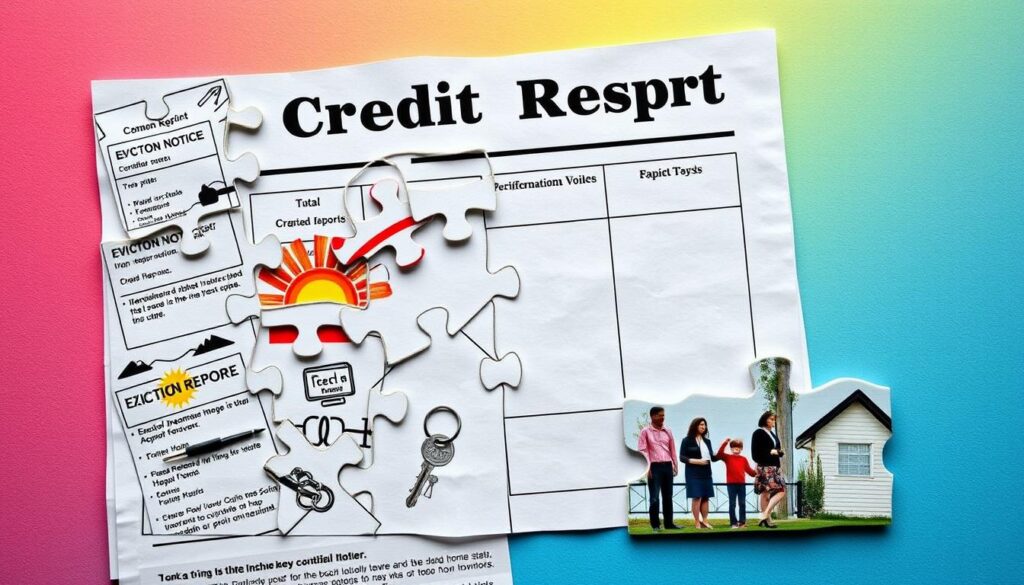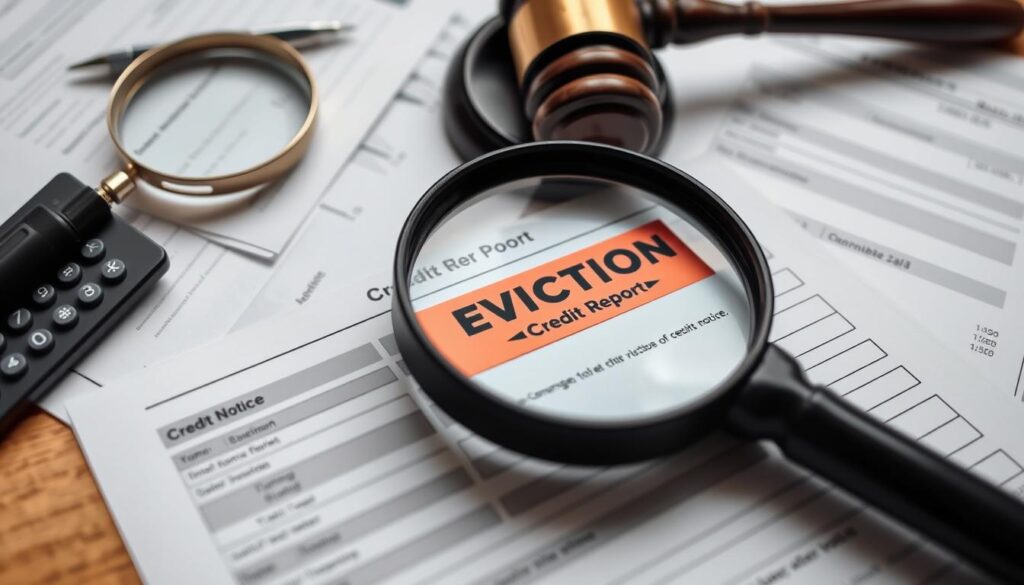Evictions on your credit report can be frustrating. But you have the right to challenge inaccurate rental history entries. Understanding evictions’ impact on your credit score is crucial.
You can take steps to dispute evictions and regain control of your financial future. This guide will help you remove eviction records from your credit report. We’ll show you how to restore your creditworthiness effectively.
Key Takeaways
- Understand the impact of evictions on your credit score and how to dispute them.
- Learn the reasons why you may need to dispute an eviction on your credit report.
- Discover the steps to obtain your credit reports and identify any erroneous eviction entries.
- Gather the necessary documentation to support your dispute and effectively communicate with credit bureaus.
- Explore strategies for removing valid eviction records and rebuilding your credit after an eviction.
Understanding Eviction Records on Credit Reports
Evictions can seriously harm your credit history and score. Knowing how evictions are reported is vital for your financial health. Let’s explore the impact of evictions on your credit profile.
What Is an Eviction?
An eviction is when a landlord legally removes a tenant from a rental property. It happens when tenants don’t pay rent or break lease rules. The process varies by state but usually involves a court ruling.
How Evictions Impact Your Credit Score
Successful evictions may appear on your credit report. This can hurt your credit score, showing financial irresponsibility. An eviction can lower your score by up to 100 points.
An eviction record on your credit report makes finding new housing tough. Landlords often check credit reports when screening tenants. This creates a cycle of housing difficulties.
“An eviction can stay on your credit report for up to seven years, negatively impacting your creditworthiness during that time.”
Knowing how eviction records on credit reports affect your credit score is crucial. It helps maintain good financial health. Next, we’ll look at reasons to dispute an eviction on your credit report.
Reasons to Dispute an Eviction on Your Credit Report
Disputing an eviction on your credit report can be crucial for various reasons. Inaccuracies like wrong dates or amounts owed provide a strong basis for dispute. Extenuating circumstances or resolved issues still appearing on your report also justify a dispute.
Incorrect information is a common reason to dispute an eviction on credit report. This could include wrong dates or miscalculated amounts owed. Gathering proof to show these errors is vital for your dispute.
Unexpected events like medical emergencies or job loss can lead to unavoidable evictions. If you can prove these factors, you may have a strong case for disputing the eviction on your credit report.
A resolved eviction still on your credit report is another valid reason to dispute. Proof of resolution, like a landlord agreement or payment documentation, can support your case.
Understanding these reasons to dispute eviction on credit report can help improve your credit standing. By addressing errors and unresolved issues, you can work towards a healthier credit profile.

“Disputing an eviction on your credit report can be a critical step in maintaining a healthy financial profile.”
Obtaining Your Credit Reports
Keeping track of your credit health is vital. The first step is getting your credit reports. You can request a free yearly report from Experian, Equifax, and TransUnion. These reports show your credit history.
Credit reports help you monitor your creditworthiness. They also help you spot potential issues. This information is crucial for maintaining good financial health.
Requesting Free Annual Credit Reports
The simplest way to get your free reports is through AnnualCreditReport.com. This official website was created by the three credit bureaus. You can request reports online, by phone, or by mail.
You’re entitled to one free report from each bureau yearly. That’s three free reports annually. Stagger your requests throughout the year for ongoing credit monitoring.
| Credit Bureau | Contact Information |
|---|---|
| Experian | Phone: 1-888-397-3742 Website: www.experian.com |
| Equifax | Phone: 1-800-685-1111 Website: www.equifax.com |
| TransUnion | Phone: 1-800-888-4213 Website: www.transunion.com |
By obtaining your credit reports and requesting free annual credit reports, you can understand your credit profile better. This helps you identify issues like eviction records that may hurt your score.
Reviewing Your Credit Reports for Eviction Entries
Checking your credit reports is vital to spot eviction entries. Look for mistakes that could hurt your credit score. Examine each eviction entry’s details carefully.
When reviewing eviction entries, focus on these key points:
- Accuracy of the eviction information: Ensure that the details provided, such as the property address, the landlord’s name, and the date of the eviction, are correct.
- Date of the eviction: Check the date of the reported eviction to determine if it is within the appropriate timeframe, as evictions can remain on your credit report for up to seven years.
- Any discrepancies or errors: Look for any inconsistencies or inaccuracies in the eviction entry that could indicate a potential error or misreporting.
| Credit Bureau | Eviction Entry Findings | Next Steps |
|---|---|---|
| Experian | Accurate eviction record from 2019, with correct property address and landlord details. | No further action required. |
| Equifax | Eviction record from 2018 with an incorrect property address. | Dispute the inaccurate eviction entry with Equifax. |
| TransUnion | No eviction records found. | Ensure TransUnion report is up-to-date and complete. |
Review your credit reports for eviction entries carefully. Fix any errors you find. This can help remove negative items from your credit history.
Taking these steps can boost your creditworthiness. It’s the first move towards a better financial future.

Gathering Supporting Documentation
Strong evidence can help you challenge an eviction on your credit report. A solid paper trail can prove the eviction record’s inaccuracy. This may lead to its removal from your credit report.
Relevant Documents to Collect
To build a strong case, gather these key documents:
- Rental agreement or lease: This can provide evidence of your tenancy and the terms of your agreement with the landlord.
- Payment records: Gather any documentation showing that you made timely rent payments, such as bank statements, canceled checks, or receipts.
- Court documents: If the eviction case went to court, obtain copies of the court filings, hearings, and any rulings.
- Communication with the landlord: Keep copies of any letters, emails, or text messages exchanged with the landlord or property management company regarding the eviction.
These documents can prove the eviction entry’s inaccuracy or unfairness. They’ll help you present a strong case for removal.
With proper documentation, you’ll be ready to dispute the eviction effectively. Your chances of success will greatly improve.
“Gathering relevant documentation is the key to a successful eviction dispute. It can make the difference between having the record removed or having it remain on your credit report.”
How to Dispute an Eviction on Credit Report
Disputing an eviction on your credit report requires diligence and persistence. By following the proper steps, you can remove inaccurate eviction information from your credit history. Let’s explore the key steps involved in this process.
First, obtain your free annual credit reports from Experian, Equifax, and TransUnion. Review these reports carefully to identify any incorrect eviction entries. This step is crucial for understanding your current credit situation.
- Obtain Your Credit Reports: Start by requesting your free annual credit reports from the three major credit bureaus – Experian, Equifax, and TransUnion. Carefully review these reports to identify any eviction entries that you believe are incorrect or unfair.
- Gather Supporting Documentation: Collect any relevant documents that can help support your dispute, such as rental agreements, payment records, or court records demonstrating the eviction was unjustified.
- Submit a Formal Dispute: Draft a concise dispute letter to each credit bureau that is reporting the inaccurate eviction information. Clearly explain the reasons for your dispute and include the supporting documentation.
- Follow Up Persistently: Credit bureaus are required to investigate your dispute and respond within 30-45 days. If the eviction information is not removed, continue to follow up and provide additional evidence as needed.
Disputing an eviction on your credit report is vital for protecting your financial health. By taking action, you can maintain a good credit score and access better financial opportunities.
Remember, persistence is key in this process. Your efforts can significantly impact your financial future.

“Persistently pursuing a credit report dispute can make a significant difference in your financial future.”
Writing a Dispute Letter
A well-crafted dispute letter is key to challenging an incorrect eviction on your credit report. It formally asks credit bureaus to investigate and remove wrong information. A structured approach can boost your chances of success.
Essential Elements of a Dispute Letter
Include these key elements in your eviction dispute letter:
- Clear Identification of the Disputed Item: Clearly state the specific eviction entry you’re disputing. Include the date, property address, and other relevant details.
- Explanation of the Dispute: Briefly explain why the eviction entry is wrong or incomplete. Provide evidence of a wrongful eviction, outdated record, or incorrect reporting.
- Supporting Documentation: Include copies of documents that back your claim. These could be court records, rental agreements, or receipts.
- Request for Removal: Clearly ask the credit bureaus to investigate and remove the wrong eviction record.
- Contact Information: Provide your full name, address, and phone number. Include any other details for easy contact during the process.
Keep your tone professional and polite throughout the letter. This can help strengthen your case and improve your chances.
Follow these steps to effectively challenge the essential elements of a dispute letter. This can increase your odds of removing the wrong eviction record from your credit report.
Submitting the Dispute to Credit Bureaus
Gathered your evidence to dispute an eviction on your credit report? Now it’s time to submit it to credit bureaus. This step is vital for removing incorrect eviction entries from your credit history.
You can submit disputes online, by mail, or phone. Remember to document all communications with credit bureaus carefully. Keep track of every interaction for future reference.
Online Dispute Submission
Credit bureaus often offer online dispute submission through their websites. This method lets you upload documents and track your dispute status easily. Follow each bureau’s specific instructions for a successful online submission.
Dispute by Mail
Prefer a traditional approach? Send a formal dispute letter with copies of your evidence. Mail these to the credit bureau’s dispute processing center. Use certified mail to keep a record of delivery.
Dispute by Phone
Some bureaus allow you to start a dispute by phone. This can be convenient, but keep detailed notes. Write down any reference numbers they provide during the call.
Whichever method you choose, follow up on your dispute status regularly. Respond quickly to any requests for more information. Stay persistent when submitting dispute to credit bureaus to ensure success.
Following Up on Your Dispute
Stay proactive after submitting your dispute to credit bureaus. Keep track of timelines to ensure efficient resolution. Credit bureaus must investigate and respond within a specific timeframe.
Timelines for Credit Bureau Responses
The Fair Credit Reporting Act (FCRA) requires credit bureaus to respond within 30 days. This can extend to 45 days if they need more information. Follow up two weeks after submitting to check on progress.
If you don’t hear back in 30 days, contact the bureau. You can submit another dispute if you’re unhappy with their response. Provide more evidence or escalate the issue if needed.
| Credit Bureau | Contact Information | Dispute Submission Methods |
|---|---|---|
| Experian | P.O. Box 4500, Allen, TX 75013 | Online, by mail, by phone |
| Equifax | P.O. Box 740256, Atlanta, GA 30374 | Online, by mail, by phone |
| TransUnion | P.O. Box 2000, Chester, PA 19016 | Online, by mail, by phone |
Being proactive and understanding response timelines can boost your success. This approach helps remove inaccurate eviction records from your credit report. Stay persistent and follow up regularly.
Handling Disputes with Landlords or Property Managers
Disputing an eviction on your credit report can be tricky. Uncooperative landlords or property managers make it even harder. But there are ways to handle these disputes effectively.
Talk to your landlord or property manager professionally. Stay calm and explain your case clearly. Provide evidence that supports your position. Your goal is to find a solution together.
If they won’t cooperate, you may need to take other steps. Contact credit bureaus directly or seek legal help. Stay organized and persistent to navigate these complex situations.
When landlords are unresponsive, try different approaches. Ask for a written response to your concerns. Reach out to consumer protection agencies for guidance. Consider mediation to find a resolution.
- Requesting a formal response in writing, outlining your concerns and the documentation you have provided.
- Contacting the appropriate regulatory or consumer protection agencies for guidance and support.
- Exploring mediation or alternative dispute resolution options to find a resolution.
Handling disputes with landlords or property managers takes patience and persistence. Explore various ways to protect your credit report. With the right approach, you can overcome these challenges.

“Effective communication and a well-documented approach are essential when handling disputes with landlords or property managers.”
Removing Valid Eviction Records
Valid eviction records on credit reports can be frustrating. Fortunately, options exist to remove this blemish from your financial history. Understanding the steps can help improve your credit standing.
Try negotiating with the landlord who initiated the eviction. They might remove the record if you’ve resolved the issue. Open communication can be a valuable first step.
If negotiation fails, seek legal assistance. An experienced attorney can review your case and explore alternative dispute resolution methods. Mediation or arbitration can provide an impartial process to address the eviction record.
Timelines for removing eviction records vary by state. Some records may remain for years, while others are removed sooner. Understanding specific timeframes and laws helps navigate the process effectively.
Removing a valid eviction record is challenging but possible. With the right strategies and persistence, you can address this issue. Seek professional help when needed to rebuild your credit and move forward.
Rebuilding Your Credit After an Eviction
Recovering from an eviction’s impact on your credit is challenging but possible. Strategic credit repair techniques can help rebuild your creditworthiness over time. Let’s explore effective strategies to get you back on track.
Strategies for Credit Repair
First, ensure accurate reporting of the eviction on your credit reports. Work with credit bureaus to update your records if the eviction has been resolved.
Focus on making timely payments for all bills and financial obligations. Payment history greatly affects your credit score. Set up automatic payments or reminders to stay on track.
Reducing overall debt levels can improve your credit. Create a plan to pay down outstanding balances, starting with high-interest debt.
Use credit-building tools like secured credit cards to establish positive credit history. This shows lenders your responsible financial management skills.

